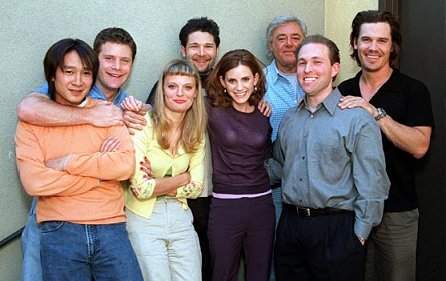 The Goonies: A Coming To Terms
The Goonies: A Coming To TermsThe first question that it raises is, is it right to substitute personal history for legitimate criticism in any critical endeavor? Autobiographical criticism is surely part of the same set of trends that now gives us bullshit memoirs instead of real novels; the same set of trends that gives us boring photographs of loved ones instead of unforgiving, stern portraits that show us what it is to love. Is it right, to contribute to the loss of real standards?
The other question that this attempt at criticism raises is, how much of my opinion of The Goonies depends on its relationship to my life?

Left to right: The Goonies' Data, Mikey, Stef, Mouth, Andi, director Richard Donner, Chunk, and Brand celebrate what they have together.
My first memory of The Goonies is a succession of half-understood fragments perceived between greedy glances at the other children at the Jewish Community Center daycare. Especially the male children with translucent skin and honey-colored hair, whose world I could partake of in some small measure by stealing their perfect Batman action figures.
My second memory was twelve years later, when "Rebecca Weinberg" said, "Oh God, let's watch a movie!" in order occupy herself at a party without introducing herself to its attendees. While the others quietly averted their eyes, while her fat hand tentatively explored my crotch, I tried to watch The Goonies again, to understand. I guess no one else was interested in the film (we watched about 15 minutes), but I was forever marked by what I saw.
Recently I watched the entire thing again.
The Goonies is part of a genre of 80's movies about kids who don't fit in confronting unfeeling society and winning. These movies usually depict the hostility of said society towards sensitive individuals in a cartoonish, overstated way. There are specific enemies: mean schoolmates, vendetta-driven administrators, unethical and uncharismatic fellow athletes. When your opposition takes the subtler form of God depriving you of the possessions you deserve--or of averted eyes and one strong, wide, piano-player hand making a gross yet irresistible journey up your thigh--these cinematic oversimplifications can leave you saddened and unfulfilled.
Fortunately, The Goonies features the most nuanced depiction in a kids' movie ever of the power dynamics and everyday malice inherent in man's social being.
The movie starts out with two school-age brothers. Their neighborhood has been bought by developers and their parents have to sell the house. They have a dim sense of the world as an unjust place, but there's no obvious villain.
The brothers try vilify the man who owns the development company (or something; his actual position is unclear--all we need to know is that he's condescending to kids). However, they quickly see that it's useless. The developers aren't criminals; they are just part of an unfair world, operating fully within its parameters.
In The Goonies brutality is a part of life, and it's presented in a fun, non-melodramatic way. The older brother casually abuses his younger brother and the younger brother's friends (fellow residents of the doomed neighborhood; together they comprise the titular "Goonies"). The friends in turn abuse the fat, verbally incontinent Jew among them, Lawrence "Chunk" Cohen. And, Chunk--the movie's real hero--channels his aggressions into weird, solipsistic pleasures that, in an elegant touch, the filmmakers only suggest.
The movie's nominal hero is Mikey, the younger brother, whose characterization makes an interesting study of the mechanics of power. He is the Goonies' leader, not because he is mighty enough to suppress the violence in the others but because he alone is oblivious to violence.
The others spend their energy fighting the world and themselves--whether with brute strength in the case of older brother Brand, with malevolent eloquence in the case of a kid named "Mouth," with technology in the case of a kid answering only to "Data," or with, uh, pathos and cowardly pranks in the case of problematic "Chunk." Meanwhile, the younger brother has a Quixote-like lack of interest in the world and in his place in its hierarchies.
No doubt Mikey can afford to be oblivious, for his bellicose older brother implicitly protects him from the others. "Every great society depends on a slave class," wrote Nietzsche. In every society, idealism only exists where there is also some subjugating force, some hidden oppression, to support it.
The result: Mikey sees only his goal, which is to find lost pirate treasure and thus save the neighborhood. The booty would be used to pay off the developers--again, the goal is not victory against injustice, only coexistence.
For the others, a goal, any goal, is welcome alternative to seething in their mutual antagonism and feeling of powerlessness. Thus, as always, they listen to Mikey. Working together, they restrain Brand in his own exercise equipment and bicycle off to find lost gold.
No spoilers: eventually they succeed. We don't live in a just world, the movie says, but sometimes we're lucky enough to survive, and even thrive, on its unfair terms. And, amidst the unwanted Rebecca Weinbergs and unowned Batman action figures of my life, that gives me hope.
The Goonies gets four of five stars. One day, pale, golden-haired, privileged Mikey will show me the way.
Posted by xerxes on Sat, 03 May 2008 18:01:34 -0400 -- permanent link




